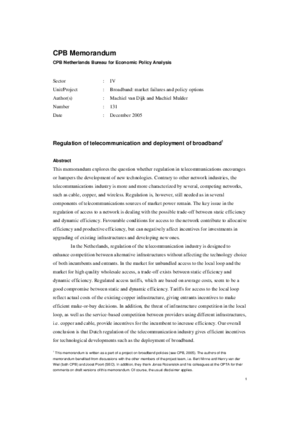Regulation of telecommunication and deployment of broadband
Regulation is, however, still needed as in several components of telecommunications sources of market power remain. The key issue in the regulation of access to a network is dealing with the possible trade-off between static efficiency and dynamic efficiency. Favourable conditions for access to the network contribute to allocative efficiency and productive efficiency, but can negatively affect incentives for investments in upgrading of existing infrastructures and developing new ones.
In the Netherlands, regulation of the telecommunication industry is designed to enhance competition between alternative infrastructures without affecting the technology choice of both incumbents and entrants. In the market for unbundled access to the local loop and the market for high quality wholesale access, a trade-off exists between static efficiency and dynamic efficiency. Regulated access tariffs, which are based on average costs, seem to be a good compromise between static and dynamic efficiency. Tariffs for access to the local loop reflect actual costs of the existing copper infrastructure, giving entrants incentives to make efficient make-or-buy decisions. In addition, the threat of infrastructure competition in the local loop, as well as the service-based competition between providers using different infrastructures, i.e. copper and cable, provide incentives for the incumbent to increase efficiency. Our overall conclusion is that Dutch regulation of the telecommunication industry gives efficient incentives for technological developments such as the deployment of broadband. See also: Do market failures hamper the perspectives of broadband?
